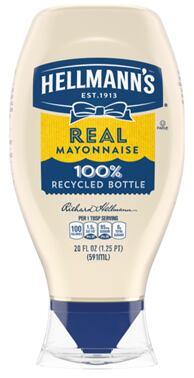Unilever revealed underlying sales growth of 5.4% for the first half of this year, with its performance in the second quarter beating consensus market expectations.
CEO Alan Jope chalked much of this success up to the company’s sense of purpose. “Our vision remains unchanged, to be the global leader in sustainable business. And we hold this ambition with certainty, the certainty that it is driving us toward the sustained delivery of superior financial performance,” he said on a conference call.
Promoting purposeful consumption
Drilling down on the performance of Unilever’s Foods and Refreshments unit, Jope said it continued its ‘strong growth trajectory’ with underlying sales growth of 8.1% in the half.
Unilever has continued to progress its Future Foods strategy. The company wants to help people transition towards healthier eating through reformulation and by developing products that offer a positive nutritional profile. Unilever plans to increase the number of products it sells with ‘the highest nutritional standards’, including benchmarks for salt, saturated fat, sugar and calories.
This effort could be seen in action with the rollout of the company’s zero-salt bullion across Europe. “This is directly linked to our commitment that 85% of our global foods portfolio will help consumers reduce their salt intake to no more than 5g a day [by 2022],” Jope explained.
The Magnum-to-Knorr maker has said it wants each of its brands to identify with a purpose. Hellmann’s is linking itself to food waste reduction, for instance. Jope insisted this resonates with consumers.
“Hellman's grew double digits as it communicated its purpose to ‘make taste, not waste’ by using dressings for creative cooking that reduces food waste by using leftovers… And in addition to encouraging consumers to reduce food waste at home, we have committed to halving our food waste in our direct global operations from factory to shelf as quickly as by 2025.”

Rising interest in sustainable consumption has been making headlines. According to a recent BEUC survey, most European consumers now consider sustainability when they are buying food, with 47% paying ‘some’ and 17.3% paying ‘a lot’ of attention.
Oliver Wright, Global Consumer Goods & Services Lead at Accenture, believes the connection between personal and planetary health and food production has been heightened by the COVID-19 pandemic. “There’s been a stronger link made by consumers between their health and what they are consuming and the health of the planet,” he noted.
“The vast majority of consumers have said they will permanently make at least one big health move as a result of the COVID experience. Even if some don’t adhere to that, the shift is so strong that we can expect this to be a longer-term trend.
“The pandemic has dramatically accelerated interest and the desire to make a positive contribution to the environment - effects that were years in the making were compressed into a matter of weeks.”
Taking a stand on issues that matter to consumers is coming to be viewed as a competitive advantage and Callum Saunders, Planning Director at ZEAL Creative, told FoodNavigator that consumers are examining the stance that businesses they support take with a critical eye.
"We’re seeing brand activism and purpose go more mainstream, driven by a combination of different factors. We’re in an age of ‘conscious consumerism’, where consumers have more access to information than ever before. Corporate social responsibility is no longer a box-checking exercise of self-regulation, but a business behaviour that consumers not only expect; it’s one they actively want to buy into. For brands, there is clearly an opportunity to gain favour with ethical consumers and live your values in real and tangible ways. But looking at this from another angle, the risk of not doing anything could provide a deafening silence in today’s world of brand activism: brands can drive real change and those who are using their powers purely for profit may come under shopper scrutiny in the near future."
Brands with purpose, or brands with politics?
But can brands overstep the mark in pursuit of purpose?
Another Unilever brand, Ben & Jerry’s, was making headlines this week for its decision to stop selling ice cream in Israeli settlements that have encroached into Palestinian land.
This is not the first time that Ben & Jerry’s has taken a controversial political stance. In the UK, for instance, the company recently waded into the middle of the ‘culture wars’ by criticising the country’s treatment of migrants on Twitter.
The response from the Twitterati was, unsurprisingly, polarised with analysis suggesting a tilt towards a negative comments when re-tweets were factored out. So while Ben & Jerry’s may have won plaudits from some for its principled stance, where does that leave the brand's relationship with the other half of the population?
UBS analyst Guillaume Delmas wanted to know more about where Unilever draws the line – or indeed if there is a line at all – between the political and the purposeful brand.
“Are these the type of decisions that you're going to be taking going forward because it's the natural next step for brand with purpose? … The bigger picture here would be, where do you draw the line between purpose and an active political agenda?" he queried.
Jope was quick to distance Unilever from the Ben & Jerry’s move in Israel, stressing that the company remains dedicated to its business in the country. “Unilever remains fully committed to our business in Israel. We have four factories, including a recent €35 million investment in a new razor factor for Dollar Shave Club. We've got 2,000 employees in our head office and distribution centres and in the factories. We put one billion shekels of investment into the country in the last 10 years. That's just the capital investment. And we're very active on the start-up community and with social programs in Israel," the chief executive said.
Indeed, Jope went on to suggest that the company will try and steer clear of such controversial topics in the future. “I can assure you, it is not our intent to regularly visit matters of this level of sensitivity… It is certainly, not our intention that every quarter, we'll have one quite as fiery as this.”

It would seem, then, that Unilever HQ would certainly draw a clear line between purpose and politics. Less controversial issues - food waste, environmental sustainability, access to hygiene and beauty positivity - are within the reach of a brand's mission but divisive and emotive subjects that stretch to political activism are not.
FMCG communications specialist Saunders would agree that brands have to walk a fine line between activism that engages - and communicating on messages that force consumers to switch off. "Like most things in life, there are two sides to the coin. On the one hand, you have a society of increasingly conscientious consumers who know that their shopping baskets have an impact upon the planet and different societies around the world. The way we shop – the brands we buy into – allow us to make a tangible impact and so for shoppers, brands doing good allows us to ‘buy into better’ and feel that a small action is contributing to a more positive change. Conversely, loading existential angst and guilt into a shopping trolley may overwhelm some consumers, who still fulfil shopping missions based on functional and social needs of products. Ben and Jerry’s is a delicious product in itself and for some shoppers, that’s all they may be looking for in their brands."
But the activism of Ben & Jerry’s is a special case. This goes back to the detail of Unilever’s 2020 acquisition of the ice cream maker, which was founded as a social enterprise with a strong sense of mission. The deal - which at the time many characterised as Ben & Jerry's 'selling out' to big business - was structured to include a provision that Ben & Jerry’s would retain an independent board of directors. The board's aim is ‘preserving and expanding Ben & Jerry’s social mission, brand integrity and product quality, by providing social mission-mindful insight and guidance to ensure we’re making the best ice cream possible in the best way possible’.
“This [intervention in Israel] was a decision that was taken by Ben & Jerry's and its independent board in line with an acquisition agreement that we signed 20 years ago. We've always recognised the importance of that agreement. Obviously, it's a complex and sensitive matter that elicits very strong feelings,” Jope commented.
So, while Unilever may draw a line between purpose and politics, it could well be that its star ice cream brand, Ben & Jerry’s, continues to take an outspoken stance on a variety of social and political issues.




